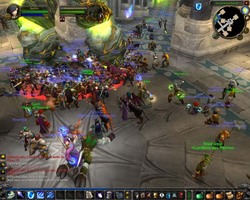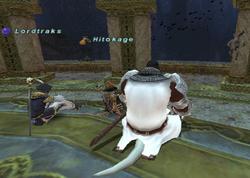Massively Multiplayer Online Role Playing Games (MMORPG)
MMORPG: The New Obsession
Massively Multiplayer Online Role Playing Games (MMORPGs) are a relative newcomer to the collection of role playing games on the market. Since the 1990s, dozens of MMORPGs have been developed with always-improving graphics and visual appeal. MMORPGs used to exist only on personal computers, but in recent years have spread to be playable on handheld video game systems like the Playstation and X-Box brands. MMORPGs have players create characters and then place them into a virtual world with towns, cities, monsters, and non-player-characters (NPCs) who give the players quests and sell items. The most popular MMORPGs operate dozens of game-servers, each of which are home to as many as 5,000 different player-created characters.
MMORPGs are in a class by themselves when compared to the other kinds of RPGs. Only in a MMORPG can players "experience" the sights and sounds of the fantasy world setting they are playing in, and the music that accompanies these stunning visuals is often truly beautiful.
Benefits of MMORPGs
Though essentially one massive video game, MMORPGs are a world in and of themselves, after a fashion. The largest games in the market today: World of Warcraft, Final Fantasy XI Online, EverQuest II, City of Heroes/City of Villians, all boast players from almost every continent taking part in their virtual worlds. Players from the United States can use in-game auto-translate functions to communicate with, work together with, and even make friends with players from Europe or Asia or Australia.
Teamwork is essential in a MMORPG. Most of these games do not lend themselves well to players going "solo", and they must assemble or join groups of others in order to gain experience points, defeat powerful monsters, complete challenging quests and missions, and discover hidden treasures. In some games, over 100 player-characters can be engaged at once in the same task or mission or in defense of a city fron "enemy attack"
Due to the way most MMORPGs work, there are central "auction houses" in each world where players can sell, buy, and trade items they've acquired on their adventures. The mechanics of such auction houses have recently been the subject of research papers and classroom experiments by economists, who study these virtual economies in order to learn more about trends in the real world. Websites such as FFXIAH give the auction house system of Final Fantasy Xi, for example, the feel of a commodities market.
Dangers of MMORPGs
MMORPGs are visually attractive games to play, much more so than any other type of role playing game. The virtual worlds are vibrant and fantastic, sometimes so detailed they can seem "more real" than reality. This is part of the allure of such games, and also the cornerstone of its biggest danger - obsession.
One thing which is standard in every MMORPG is the need to "level" characters. Starting player-characters begin at level one, and time must be spent on those characters to get them to the highest level in the game (50 in some, 60 or 75 in others). Raids, fights against notorious monsters, or defending cities during "events" can take hours at a time, and the hunt for special monsters whose treasures are particularly valuable can take hours or days of relentless pursuit by player-characters. Players who immerse themselves in these fantasy worlds run the risk of growing too attached to the game world, and losing their footing in the real world. Psychological studies are almost commonplace in recent years studying the effects of long term exposure to MMORPGs in children and young adults. This danger is very real for MMORPG players, and can have terrible consequences to a person's life if unchecked.
Another danger of MMORPGs is the issue of money. Tabletop RPGs only cost as much as the books and dice do, and those last for years. LARPs only incur costs when acquiring game sites or costuming, though some groups have yearly dues to help their organizations continue to provide services. MMORPGs, being so reliant on internet technology, servers, customer service, and technical support, carry with them montly fees (except for one or two) in addition to the initial cost of the game itself, and any subsequent game-expansions that are released.
The illegal activity called Real Money Trade (RMT) is becoming an ever-prevalent issue for game companies and players. RMT occurs when players sell their in-game items, currency, or even their characters and accounts to other players for dollars. Since this is not regulated by the game-companies themselves, it is a violation of the terms of service, and many players seeking a "quick" way to get in-game benefits often spend hundreds or thousands of dollars, only to be banned from the MMORPG in the end. In the meantime, the players suffer shifts and spikes in their virtual economy, causing other problems.
Above: Player-Characters in World of Warcraft (WoW) on a large "Raid"
Right: Players in the intersellar MMORPG "Eve Online" prepare to rendezvous with supply ships following an asteroid-mining mission
Below: The Trailer for the newest expansion to a MMORPG, the "Wings of the Goddess" for Final Fantasy XI Online.


